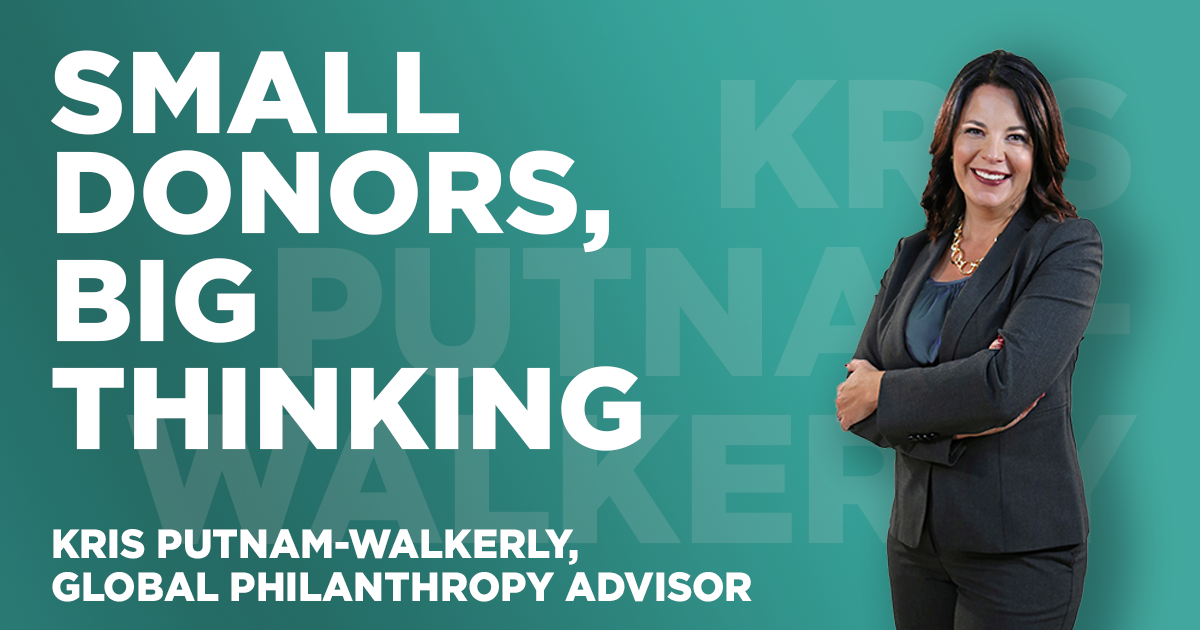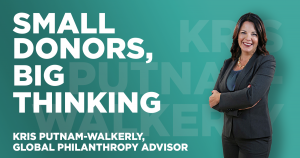How Small Investors Can Change the World
“Small but mighty” is a phrase we’ve seen applied time and again to describe something that seems too little to notice but that packs a wallop when it comes to impact. A boy named David fells giant Goliath with a single stone. An ant moves a rubber tree plant. The electrons of two hydrogen atoms bond with an oxygen atom, creating life-giving water.
A small funder makes a philanthropic investment that changes the world.
It’s entirely possible. Unfortunately, the thing that most frequently holds small funders back is their own belief that they’re too small to make a big difference. In fact, small funders are often well positioned to be the catalyst or linchpin that launches true and lasting change.
Nonprofits such as Kiva are creating opportunities for people around the world by asking people to lend (not donate) as little as $25. This small amount (or microloan) goes toward entrepreneurs all around to world to help pull them out of poverty and create a better future for themselves and their communities.
Other small funders, like the Rogers Family Foundation, make a giant impact by sticking with one issue, formulating a clear strategy of what they want to accomplish and implementing that strategy. The Foundation has been working toward changing the education strategy in the San Francisco Bay Area and has seen amazing results, with increased numbers of children from underprivileged homes graduating from high school and going to four-year colleges.
Why are these small donors so mighty? Here are three good reasons:
First, small funders typically serve smaller geographic locations in which they build the strong relationships necessary for lasting impact. Many are family philanthropies whose roots run deep in the communities they serve. Small funders can leverage those relationships to spur investments far beyond their own. For example, a small rural funder might kick-start a community effort to save or expand a hospital that is slated for closure, and in doing so rally the entire community to lend their support and voices to the effort. (Note that this has very little to do with the size of the funder’s financial resources. It’s all about the power of personal relationships that larger funders rarely have.)
Second, small funders can be more nimble and responsive than larger ones that are hamstrung by bureaucracy. With smaller boards and fewer staff members, small funders often can make decisions quickly and get resources out the door faster. Consider a donor-advised fund in a small river town that unexpectedly floods. Within 24 hours, it can approve emergency funding and send out relief and recovery funds—all in a single day, as opposed to weeks. That’s no small feat, and it can have a huge impact on those whose lives might otherwise be devastated.
Third, small funders can be more comfortable when it comes to taking risks. Effective philanthropy needs venture capital and seed money, but larger foundations may have too many barriers and safeguards in place to take advantage of those small opportunities that can become big successes. Or those opportunities may be so small that they don’t even show up as a blip on the radar of big funders.
For example, a small funder may see promise in a local school’s new idea for increasing reading skills. There’s no real evidence that the program will succeed — just a teacher’s intuition and a principal who’s willing to try anything. The donor decides to take a risk and makes a commitment to support the program in one school. The program delivers impressive results and spreads to every school in the district. The district presents its model and successes at a national education conference, and more school districts adopt the program. It catches the attention of a leading university, which studies its efficacy and, eventually, the reading program becomes a nationally recognized, evidence-based practice. All this came from one relatively modest hometown investment by a funder that recognized the potential and was willing to take a risk.
There are countless other ways that any small funder, regardless of size or focus, can potentially make a huge impact. It doesn’t take a lot of cash, just a willingness to look for opportunity, take risks and believe in the power of small grants.
Are you a small funder who wants to make a significant impact, but aren’t sure where to start? Hiring a trusted advisor can give you the educated guidance you need to find the right opportunities, know when to take risks and build lasting relationships in your community. I’ve been serving as a trusted advisor for more than 20 years with funders of all shapes and sizes. If you’d like to learn more, simply reply to this email or schedule a call with me, and we can talk about next steps.
This article was originally written for and published by Forbes.com.
© 2019 Kris Putnam-Walkerly. All rights reserved. Permission granted to excerpt or reprint with attribution.
About Kris Putnam-Walkerly
I’m a global philanthropy expert, advisor and award-winning author. I help ultra-high net worth donors, celebrities, foundations and Fortune 500 companies dramatically increase the clarity, speed, impact and joy of their giving. I’m the author of Confident Giving: Sage Advice for Funders, was named one of “America’s Top 25 Philanthropy Speakers”(along with U2’s Bono!), I write about philanthropy for Forbes.com, Alliance Magazine, De Dikke Blauwe and am frequently quoted in leading publications such as Bloomberg, NPRand WSJ.
Whether you are just getting started in philanthropy, want to refresh your giving strategy, or need to catapult yourself to your desired future, I can help. Let’s talk! Call me at +1-800-598-2102 x1, email me at kris@putnam-consulting.com or schedule a call.
__________________________________________________________________________
“As my trusted advisor, Kris Putnam-Walkerly helped our foundation navigate an organizational transformation to become more strategic and develop a clear plan to implement our new strategy. She offers funders a fresh perspective and practical tips to improve their giving.”
Dr. Laura Gerald, President, Kate B. Reynolds Charitable Trust
__________________________________________________________________________
Want to learn more? Visit my website to learn how I help funders, access free resources, and read client testimonials.








